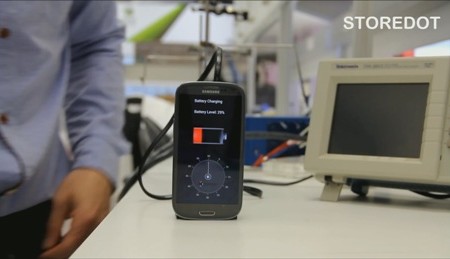Bio-Battery Recharges in 30 Seconds
on

The electrolyte is also modified with bio-organic nanodots made from peptide molecules. The new battery technology came about as a result of crossover research into Alzheimer’s disease at Tel Aviv University. The work identified organic peptides (amino acids) which are now being used in StoreDot’s bio-organic battery. The nanodots are made from a range of naturally occurring environmentally-friendly bio-organic raw materials and employ a basic biological mechanism of self-assembly, making them cheap to manufacture.
A conventional micro USB connector would not be able to handle the 180 A necessary for a 30 second recharge of a typical cell phone battery. These sort of charge times would remove a significant hurdle in the development of electric vehicles if the technology is transferable. The design is still at its prototype phase; the developers anticipate the final design of the battery and its charger unit will see a significant reduction in size.


Discussion (0 comments)